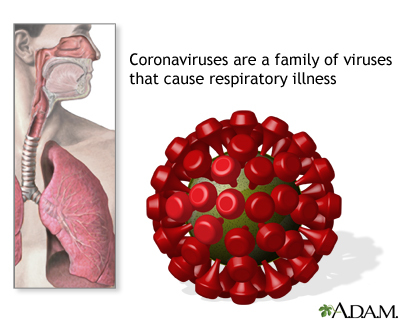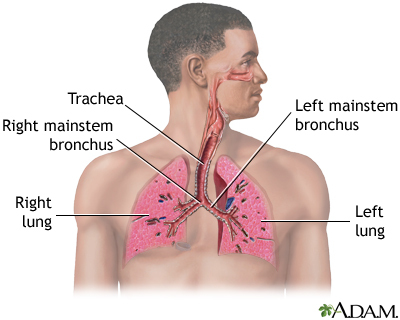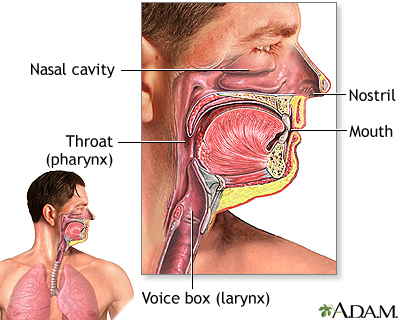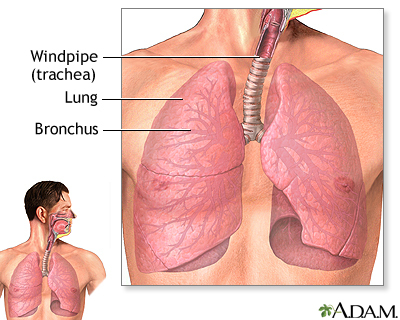- Status
- Accepting Candidates
Coronavirus
Definition
Coronaviruses are a family of viruses. Infection with these viruses generally causes mild to moderate respiratory illnesses, such as the common cold. Some coronaviruses cause severe illness that can lead to pneumonia, and even death.

Alternative Names
Coronavirus - SARS; Coronavirus - 2019-nCoV; Coronavirus - COVID-19; Coronavirus - Severe acute respiratory syndrome; Coronavirus - Middle East respiratory syndrome; Coronavirus - MERS
Causes
There are many different coronaviruses. They affect both humans and animals. Common human coronaviruses cause mild to moderate illnesses, such as the common cold.
Patient Education Video: Common cold
Some animal coronaviruses evolve (mutate) and are passed from animals to humans. They may then spread through person-to-person contact. The coronaviruses that spread from animals to humans can sometimes cause more severe illness:
- Severe acute respiratory syndrome (SARS) is a serious form of pneumonia. It is caused by the SARS-CoV coronavirus. No cases in humans have been reported since 2004.
- Middle East Respiratory Syndrome (MERS) is a severe respiratory illness. MERS is caused by the MERS-CoV coronavirus. About 30% of people who have gotten this illness have died. Some people only have mild symptoms. MERS continues to cause illness in humans, mainly in the Arabian Peninsula.
- COVID-19 can be a respiratory illness that causes cold or flu-like symptoms, but it can also affect other parts of your body. It is caused by the SARS-CoV-2 virus (severe acute respiratory syndrome coronavirus 2). COVID-19 can be a mild to serious illness and even fatal. COVID-19 is a serious public health threat globally and in the United States.
Many coronaviruses originate in bats, which can infect other animals. SARS-CoV spread from civet cats, while MERS-CoV spread from camels. The latest virus, SARS-CoV-2, is also suspected to originate from animals. It is from the same family of viruses as SARS-CoV, which is why they have similar names. There are many other coronaviruses circulating in animals, but they haven't spread to humans.
Once a person has been infected by a coronavirus, the infection can spread to a healthy person (person-to-person transmission). You can catch coronavirus infection when:
- An infected person sneezes, coughs, or blows their nose near you and releases the virus into the air (droplet infection)
- You touch, hug, shake hands with, or kiss an infected person
Symptoms
Human coronaviruses that cause the common cold spread from person-to-person. Symptoms develop in 2 to 14 days. These include:
- Runny nose
- Sore throat
- Sneezing
- Nasal congestion
- Fever with chills
- Headache
- Body aches
- Cough
Exposure to MERS-CoV, SARS-CoV, and SARS-CoV-2 can cause severe symptoms. These include:
- Nausea and vomiting
- Shortness of breath
- Diarrhea
- Blood in cough
- Death
Severe coronavirus infection may cause:
- Croup
- Pneumonia
- Bronchiolitis
- Bronchitis
Symptoms may be severe in certain people:
- Children
- Older adults
- People with chronic conditions such as diabetes, cancer, chronic kidney disease, heart diseases
- People with respiratory illnesses such as asthma or COPD
Patient Education Video: Pneumonia
Exams and Tests
Your health care provider may take a sample of the following for laboratory testing:
- Nasal swab (from the nostrils) or throat swab for a polymerase chain reaction (PCR) test for SARS-CoV-2 or other viruses
- Blood tests
- Sputum culture
Stool and urine samples may also be taken in some cases.
You may need further testing if your infection is severe. These tests may include:
Diagnostic tests may not be available for all kinds of coronavirus.
Treatment
At this time, there is no specific treatment for coronavirus infection except for SARS-CoV-2. For a coronavirus infection not due to SARS-CoV-2, medicines are given only to ease your symptoms. Experimental treatments are sometimes used in severe cases.
Mild coronavirus infections, such as the common cold, will go away in a few days with rest and self care at home.
If you are suspected to have a severe coronavirus infection and are treated in a hospital, you may:
- Have to wear a mask
- Stay in an isolated room or ICU for treatment
Treatment for severe infections may include:
- Antibiotics, only if you also have bacterial pneumonia
- Antiviral medicines
- Steroids
- Oxygen, breathing support (mechanical ventilation), or chest therapy
Treatment for COVID-19, the illness due to SARS-CoV-2, may involve additional antiviral medicines.
Outlook (Prognosis)
Common colds due to coronavirus usually resolve on their own. Severe coronavirus infections may require hospitalization and breathing support. Rarely, certain severe coronavirus infections may lead to death, especially in older people, children, or people with chronic conditions.
Possible Complications
Coronavirus infections may lead to bronchitis or pneumonia. Some severe forms may cause organ failure, and even death. Infection with SARS-CoV-2 may lead to long COVID in some people.
When to Contact a Medical Professional
Contact your provider if you have:
- Come in contact with a person with a severe coronavirus infection
- Travelled to a place which had an outbreak of a coronavirus infection and have developed common cold symptoms, shortness of breath, nausea, or diarrhea
Prevention
Follow these steps to lower your risk of infection:
- Avoid contact with people who have coronavirus infection.
- Avoid travelling to places that have an outbreak of coronavirus infection.
- Wash your hands properly or clean them with an alcohol-based hand sanitizer.
- Cover your mouth and nose with a tissue or sleeve (not your hands) when you sneeze or cough. Throw the tissue away.
- Do not share food, drink, or utensils.
- Clean commonly touched surfaces with a disinfectant.
There are vaccines that can prevent severe disease with COVID-19. Contact your local health department to find out about availability in your area. Information about COVID-19 vaccines is available from the Centers for Disease Control and Prevention at www.cdc.gov/coronavirus/2019-ncov/vaccines/index.html.
If you are travelling, talk to your provider about:
- Being up-to-date with vaccines
- Taking self-test kits
- Carrying medicines
Gallery






References
Centers for Disease Control and Prevention website. COVID-19: About COVID-19. www.cdc.gov/coronavirus/2019-ncov/your-health/about-covid-19.html. Updated January 24, 2022. Accessed January 20, 2023.
Gerber SI, Watson JT. PRE-2019 coronaviruses. In: Goldman L, Schafer AI eds. Goldman-Cecil Medicine. 26th ed. Philadelphia, PA: Elsevier; 2020:chap 342.
Perlman S, McIntosh K. Coronaviruses, including severe acute respiratory syndrome (SARS) and Middle East respiratory syndrome (MERS). In: Bennett JE, Dolin R, Blaser MJ eds. Mandell, Douglas, and Bennett's Principles and Practice of Infectious Diseases. 9th ed. Philadelphia, PA: Elsevier; 2020:chap 155.
World Health Organization website. Coronavirus disease (COVID-19). www.who.int/health-topics/coronavirus#tab=tab_1. Accessed January 21, 2023.
Related specialties
Clinical Trials: Coronavirus
UF Health research scientists make medicine better every day. They discover new ways to help people by running clinical trials. When you join a clinical trial, you can get advanced medical care. Sometimes years before it's available everywhere. You can also help make medicine better for everyone else. If you'd like to learn more about clinical trials, visit our clinical trials page. Or click one of the links below:
News and Patient Stories: Coronavirus
Combination of two common compounds improves COVID survival in mice, UF researchers find
November 22, 2023
GAINESVILLE, Fla. — The combination of two over-the-counter compounds tested in mice significantly improved their chances of surviving the virus that causes…
College of Medicine, College of Pharmacy, Emerging Pathogens Institute, +1 more

UF Health study finds association between news consumption and COVID-19 precautions
August 15, 2023
A new University of Florida College of Medicine study reinforces the influence of the news media during a health emergency, showing older adults who spent more…
Department of Health Outcomes & Biomedical Informatics, +5 more

Latest podcast episodes
The coronavirus’ delta variant most infectious yet
The coronavirus is giving us all a lesson in viral evolution. As long as the virus exists, with millions of human hosts available to it, it will accumulate mutations. Most will be harmless. A few...
CDC says wearing two masks better to prevent coronavirus transmission
As the rate of COVID-19 vaccinations grows across the globe, we’re finally seeing some light at the end of the pandemic tunnel. But we’re far from home yet. Now is not the time to throw away your...
Half-masking might increase risk of coronavirus infection
It’s a common cheat in the days of pandemic. People keep a mask over their mouth but keep their nose uncovered, perhaps guessing coronavirus transmission most likely occurs through the mouth. But...